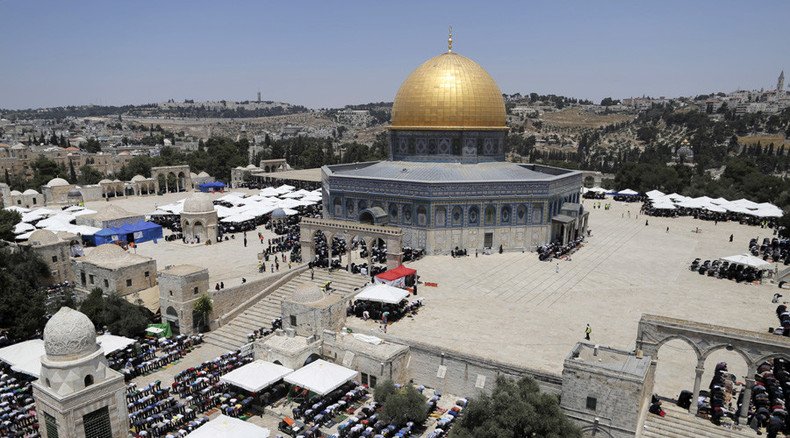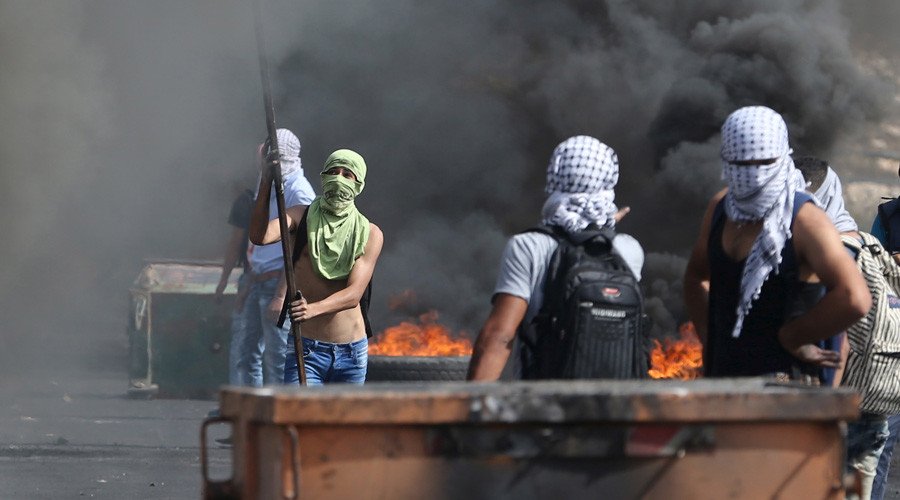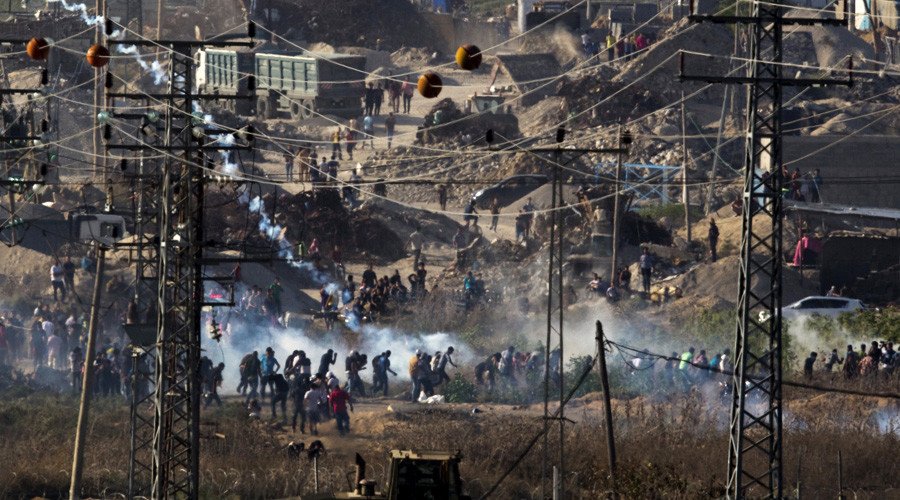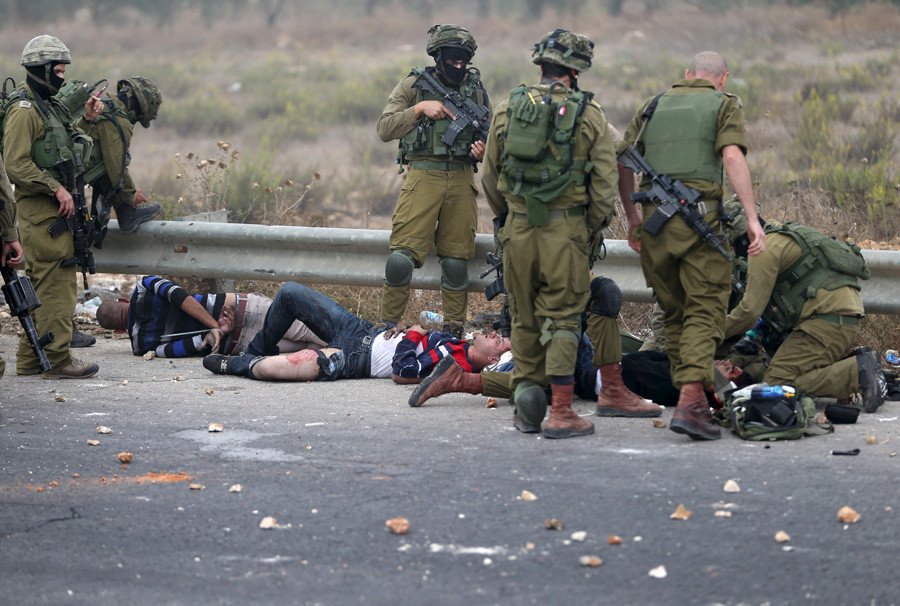Is a 3rd Intifada now inevitable?

Tensions and violence across Palestine have reached the point where we are on the verge of a third Intifada. Given the unrelenting nature of the injustice endured by the Palestinians, if it does erupt no one should be surprised.
The question when it comes to the Israeli-Palestinian conflict is not if a people who are occupied, besieged, denied their rights, justice, and dignity will rise up. The question is when.
What there is not – and certainly not any longer – when it comes to this intractable and decades-long question is the option of taking no side. Injustice invites its own response and the rioting of Palestinian youths across the West Bank that has been taking place is an entirely natural and justified response to the oppression they were born into and which is all they have ever known.
MORE: Pregnant Palestinian woman killed, 2 civilians injured in Israel’s airstrike on #Gazahttp://t.co/yIK7SBRJyzpic.twitter.com/c8Y3i2rIuZ
— RT (@RT_com) October 11, 2015Urging restraint on the part of an oppressed people merely abstracts the root cause of the crisis. Indeed, given the scale and longstanding nature of their oppression, the Palestinians have exercised Herculean restraint over the years, patiently waiting for the so-called international community to finally recognize their plight and act to end it.

For when it comes to exercising restraint, the aforementioned international community’s restraint when it comes to upholding international law lies at the root of the problem. Israel’s repeated, flagrant and brazen violations of the rights of the Palestinian people could not take place without the diplomatic and strategic support it receives from its friends in the West.
No other state is accorded the exceptionalism that Israel enjoys and abuses. And no other people have been forced to endure such systemic and systematic injustice as the Palestinian people have as a consequence.
A particular source of outrage for Palestinians has been Israel’s alleged encroachment on the Al-Aqsa mosque compound in Jerusalem’s Old City. The third holiest site in Islam, the site of Al-Aqsa is also home to the Dome of the Rock, another sacred site in Islam, and the Temple Mount, the holiest site in Judaism.
It is does not take a genius to understand the tensions that are prevalent here.

With the Israeli government’s decision to expand the Jewish prayer plaza at the Western Wall, thereby encroaching on the site of Al-Aqsa, the status quo arrangement covering the Old City’s holy places will be violated.
Regardless of the findings of a Jerusalem court that the proposed expansion would constitute a violation of Islamic authority, risking a third Intifada. The Netanyahu government has indicated it intends to press ahead with the plans regardless, a decision that has proved the catalyst for the current upsurge in violence.
Compounding the rage that has exploded across the West Bank this past fortnight, and which has spread to Gaza, has been the growing settlement activity in East Jerusalem and the confiscation of more and more Palestinian land. The result has been the deaths of more than 20 Palestinians, including a pregnant women, named as Nur Hassan, and her 2-year old child – killed when an Israeli airstrike in Gaza demolished their home, with many more wounded. The use of live ammunition by Israeli soldiers against gangs of youth throwing rocks and other missiles has been a feature this time round, yet more evidence of Israel’s willingness to kill and maim Palestinians without hesitation or restraint.
A number of Israelis and Israeli policemen have meanwhile been stabbed in random attacks, and there is little sign of the violence ending anytime soon.
The word “Intifada” (uprising) holds strong meaning for Palestinians and Israelis alike. The first Intifada erupted in 1987. Also known as the “War of the Stones,” it began when an IDF truck collided with a car in the Jabaliya refugee camp in Gaza, killing four Palestinians.

The ensuing Intifada involved the mass participation of the people and was fuelled by civil disobedience, boycotts, strikes and iconic images of young men and women, their faces covered in kaffiyahs (Palestinian scarves), facing down Israeli soldiers, tanks and armored vehicles with stones and Molotov cocktails. It saw the emergence of a grassroots leadership within the Occupied Territories and Gaza, operating without the authority of the PLO, at the time led by Yasser Arafat, who was in exile in Tunis when it began.
The first Intifada lasted six years until the signing of the Oslo Accords in 1993. Over 2,000 Palestinians and 160 Israelis had been killed by the time it ended.
The second Intifada was a far more gruesome affair. It began in 2000 after then-Israeli Prime Minister Ariel Sharon made a controversial visit to Temple Mount, site of the Al-Aqsa mosque, accompanied by hundreds of security men. Sharon proclaimed: “Temple Mount is in our hands.” His visit and this proclamation was deemed a threat to Al-Aqsa and led to an eruption of protest, which soon escalated to become a war of lethal violence.
A wave of suicide bomb attacks in Israel brought the violence home to ordinary Israelis as never before. Israel was condemned around the world, including by the UN, for its use of collective punishment against the entire Palestinian population, involving the widespread use of home demolitions and arrest and imprisonment without trial or due process.
By the time it ended in early 2005, around 3,000 Palestinians and 950 Israelis had been killed, with over 5,000 Palestinian homes demolished and a further 6,500 seriously damaged.
It is not hard to understand, given the history of the previous two intifadas, how the prospect of a third strikes fear into the hearts of Palestinians and Israelis alike. It is why the silence of the international community in response to this latest upsurge in violence constitutes such a grievous abdication of responsibility.
The Palestinians are not asking for justice – they are demanding it, and rightly so. Until they have it, there will be no peace.
LISTEN MORE:
The statements, views and opinions expressed in this column are solely those of the author and do not necessarily represent those of RT.













